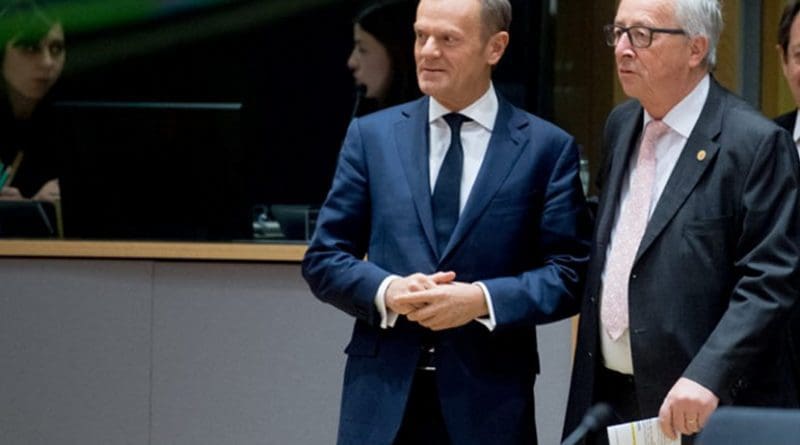EU Summit Sees Heightened Tensions Over Migration
By EurActiv
By Catherine Stupp
(EurActiv) — EU heads of state ended the first day of a summit with no sign of tensions thawing amid recent disagreements on migration.
Most leaders left the European Council headquarters in Brussels without speaking to the press early Friday morning (15 December), after a heated, more than two-hour-long debate over migration.
European Commission President Jean-Claude Juncker and European Council President Donald Tusk did not hold a joint news conference, as they usually do at summits.
The leaders will meet again on Friday for discussions on Brexit and the economic and monetary union.
Tensions have been flaring between the Commission and Council after Tusk called the Commission’s proposal for mandatory quotas to distribute refugees between EU countries “ineffective” in a leader to heads of state. Tusk, who is a former Polish prime minister, asked the leaders to agree on a solution by June 2018.
That didn’t go over well with the Commission: earlier this week, EU Migration Commissioner Dimitris Avramapoulos slammed Tusk’s letter as “anti-European”.
In a brief statement to journalists as he left the summit on Friday morning, Juncker said the leaders “controversially discussed” Tusk’s proposal.
One EU source said that the phrase “anti-European” did not come up during the “sober and frank” debate on migration.
The source said the summit was a “window of opportunity” to discuss the EU’s response to migration from the Middle East and African countries because the number of people arriving in Europe has dropped since the crisis peaked in 2015.
But even the lower number of refugees did not help heads of state to overcome their disagreements.
Leaders are divided over the mandatory quotas. Southern countries including Italy want every member state to be required to take in refugees, but some eastern countries oppose quotas.
The Commission first introduced quotas in 2015 to help Italy and Greece manage an uptick in asylum seekers. Just last week, the EU executive referred the Czech Republic, Poland and Hungary to the European Court of Justice for ignoring the quota to relocate refugees from Italy and Greece.
German Chancellor Angela Merkel was dismissive of Tusk’s proposal to reconsider the quota system.
“I made it very clear that I’m not pleased with the simple statement that the rules we’ve put in place up until now don’t work. We still have a lot of work to do here,” Merkel told reporters as she left the Council building. She also did not hold a press conference.
“Solidarity cannot only have external dimensions, it also has to exist internally,” Merkel added. Germany took in more than one million refugees in 2015.
Some heads of state expressed support for the Commission’s work to slash the number of migrants arriving through the Mediterranean.
Outgoing Austrian Chancellor Christian Kern praised Italy, the Commission and Merkel for crafting a project to cut migration from Libya and for a 2016 agreement to reduce migration through Turkey.
Kern said the lowered migration figures removed some pressure from the debate over quotas, but he admitted that “there is still no comprehensive approach, to put it nicely”.
Earlier on Thursday, prime ministers from the Visegrad countries of Poland, Hungary, the Czech Republic and Slovakia pledged €35 billion to support the Italian-led programme to cut off migration from Libya to Europe.
In a statement, the Visegrad group said the financial commitment reflects the countries’ willingness to address migration by stopping its root causes. The group has opposed quotas mandating how many refugees each EU member state should take in.
One EU source said the commitment from the four countries was important but will likely not be decisive in the debate over quotas.
Italian Prime Minister Paolo Gentiloni said when he arrived at the summit, “We will continue to insist that a commitment on the relocation of refugees is needed,” according to a translation published by Reuters.

